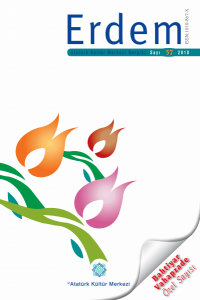Abstract
Meslek ve amel (ilke) birliği bulunmadan işbirliği yapılamaz. Meslek
ve ilke her bir kesin kendi iç dünyasından, soykökünden yaranır. Bu
doğada da böyledir, toplumda da.
Edebiyatın en önemli amacı insanlarda kültür, maneviyat, ahlak
terbiye etmektir. O edebiyat ahlak ve maneviyat terbiye ediyor ki, onun
meslek ve ameli milli-ulusal meslek ve ameldir.
İkinci Dünya Savaşı döneminde yaratıcılığa başlayan Bahtiyar
Vahapzade edebiyata büyük meslek, ilkeler şairi gibi geldi. İlk şiirlerinden
Vatan, Dil ve milli düşünce konularını kendi için daimi ilke bilen şair “ben
kimim, soyköküm kimdir” ilkesi ile edebiyat ve ebediyat yolunu çizdi,
yaşam sonuna kadar bu ilke ve mesleğine ihanet etmedi, sadık kaldı.
“Ana dili” şiirinde şair bu ilkeye sadık kaldığını bir kez daha onayladı.
Ey kendi öz dilinde konuşmağı ar bilen,
Bunu iftihar bilen
modalı edebazlar.
Kalbinizi okşamır koşmalar,
telli sazlar.
Bırak onlar benim olsun,
Ancak Vatan ekmeyi,
bir de anne yüregi
sizlere qanim olsun.
Azerbaycan edebiyatında Bahtiyar Vahapzade ile Halil Rıza meslek
ve ilke birliği her zaman birbirini takip etmiş ve onaylanmıştır. 1960’lı
yıllarda yaratıcılığının geniş bir aşamasına başlayan Halil Rıza “Apardı
seller Saranı” şiirini yazdı. Bu şiir Bahtiyar Vahapzade’nin ünlu
“Gülüstan” poyeminin mantıkî ve ilke bakımından devamı idi...
Çağdaş Azerbaycan şiiri meslek ve sanat birliği bakımından bu iki
şaire daha çok minnettardır.
References
- Bəxtiyar Vahabzadə, Seçilmiş əsərləri, 2 cilddə,1 cild, Bakı 2004.
- Bəxtiyar Vahabzadə, Seçilmiş əsərləri, 2 cilddə, II cild, Bakı 2004.
- Cəmil Həsənli, Azərbaycanda milli məsələ: Siyasi rəhbərlik və ziyalılar (1954-1959), Bakı 2008.
- Doğumunun Yüzellinci Yılında Namık Kemal, Ankara 1993.
- Halil Rıza, Məndən başlanır vətən (şeirlər və poemalar), Bakı 1988.
- Halil Rıza, Ayla Günəş Arasında, Bakı 1992.
- Kabaklı, Ahmet, Türk Edebiyatı, (gözden geçirilmiş dokuzuncu baskı III cilt, İstanbul 1997.
- Yetiş, Kazım, Mehmet Akif’in Sanat-Edebiyat ve Fikir Dünyasından Çizgiler, Ankara 1992.
Abstract
Cooperation is not possible without the unity of occupation, ideas and
goals. Occupation and goals are originated from within the internal
world of a person.
As such is true either in nature, or in society. The main goal of
literature is to educate humans in terms of culture, spirituality and
ethics. The literature which provides ethics and spirituality, deals with
national activities.
Bakhtiyar Vahabzadeh, who began his literary activity in the Second
World War period came into literature as a poet of great ideals and
persuasions. The poet, who chose the issues of motherland, language
and national ideas as eternal goals starting from his first verses, drew
his path in literature with the questions “who I am and “what, my origin
was”, and remained devoted to these principles until the end of his
life. He approved his loyalty to these principles once more in his poem
“mother tongue”: The naughty ones, who are ashamed of speaking
their native language, you don’t enjoy the fringed saz and goshmas, let
them be mine, but let the bread of your land, the heart of your mother
punish you.
The unity of occupation, ideals and goals of Bakhtiyar Vahabzadeh
and Khalil Rıza in literature always followed and approved each other.
Khalil Rıza, who began the most important period of his activity in
the 1960s wrote his poem “Apardı Seller Saran’ı” (Floods take Sarah
away) as the continuation of Bakhtiyar Vahabzadeh’s poem “Gulustan”
in terms of of logics and ideology.
Modern Azerbaijan poetry is greatly thankful to these poets from the
viewpoint of the artistic and occupational unity.
References
- Bəxtiyar Vahabzadə, Seçilmiş əsərləri, 2 cilddə,1 cild, Bakı 2004.
- Bəxtiyar Vahabzadə, Seçilmiş əsərləri, 2 cilddə, II cild, Bakı 2004.
- Cəmil Həsənli, Azərbaycanda milli məsələ: Siyasi rəhbərlik və ziyalılar (1954-1959), Bakı 2008.
- Doğumunun Yüzellinci Yılında Namık Kemal, Ankara 1993.
- Halil Rıza, Məndən başlanır vətən (şeirlər və poemalar), Bakı 1988.
- Halil Rıza, Ayla Günəş Arasında, Bakı 1992.
- Kabaklı, Ahmet, Türk Edebiyatı, (gözden geçirilmiş dokuzuncu baskı III cilt, İstanbul 1997.
- Yetiş, Kazım, Mehmet Akif’in Sanat-Edebiyat ve Fikir Dünyasından Çizgiler, Ankara 1992.
Details
| Primary Language | Turkish |
|---|---|
| Journal Section | Erdem |
| Authors | |
| Publication Date | August 1, 2010 |
| Published in Issue | Year 2010 Issue: 57 |
ERDEM Journal is indexed by TR Dizin, MLA International Bibliography, EBSCOhost, SOBIAD, ASI (Advanced Science Index) ISAM, DAVET and AYK Journal Index.


